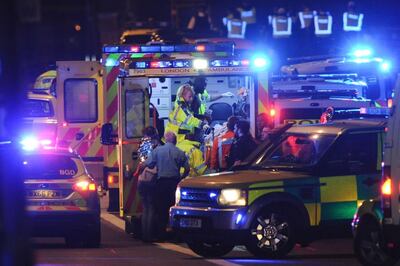Convicted terrorists are “deliberately” pretending to sleep, wear headphones or take long toilet breaks to avoid taking part in deradicalisation programmes.
In his annual report, Jonathon Hall QC, the UK’s independent reviewer of terrorism legislation, warns there are “significant” issues with the effectiveness of disengagement schemes.
In November 2019, Usman Khan, 28, killed two people near London Bridge after attending a Desistance and Disengagement Programme (DDP). He had been released early from his jail sentence after a conviction for plotting to bomb London's Stock Exchange.
“Compulsory attendance does not necessarily lead to beneficial engagement,” Mr Hall said.
“Disruptive behaviour or deliberate disengagement during mentoring (both practical and theological) is, I am informed, a significant problem.
“The more extreme examples include pretending to sleep, wearing headphones or taking long toilet breaks. Preventing such behaviour may be easier for offenders on licence, who have a general obligation to ‘be of good behaviour’.”
The DDP schemes were launched in 2016 to focus on rehabilitating those who have been involved in terrorism and related activity to reduce the risk they pose. It was initially aimed at released prisoners but was extended to serving prisoners in 2018.
Mr Hall said one reason for the lack of engagement could be due to an ongoing court case involving a defendant known as QX who has been accused of playing chess and reading books during his DDP sessions.
The defendant has claimed that anything he says during mentoring sessions could be used against him in court.
Mr Hall also called into question the effectiveness of the UK’s deradicalisation schemes -- Prevent and Channel -- which aim to deter at-risk individuals from extremism.
“It is certainly possible to say that individuals are not deterred from committing offences simply because they know they have been identified as possible terrorists of the future,” he said.
“In May 2019 alone, three individuals were convicted of terrorism offences having earlier been referred to Channel.”
The government has said his report is due to be submitted in September to the Home Secretary who intends to respond to it by the end of the year.
“The review will consider the past and present delivery and impact of Prevent and make recommendations for future improvements to the strategy for supporting people vulnerable to being drawn into terrorism,” the Home Office said in a statement.
Mr Hall also warned of the radicalisation risks posed by UK prisons.
“Prison time for terrorist offenders is increasing ever upwards,” he said.
“The reforms in 2020 mean that sentences will be increased further, and release dates delayed. One significance of these increasing terms is the attention that will need to be given to events in prison.
“Prison can make individuals more dangerous than when they entered, or be the setting for further terrorism offending. During 2019, a prisoner serving a life sentence for stabbing his mother was convicted of circulating ISIS propaganda in prison. In January 2020, a convicted terrorist, Brusthom Ziamani, and another prisoner, Baz Hockton, who had been radicalised in prison, attempted to murder a prison officer in HMP Whitemoor whilst wearing fake suicide belts.”
Mr Hall also proposed new powers for the police to demand a terrorist suspect provide their device passwords or face a lengthy jail term, in a bid to thwart impending attacks.
“I recommend that consideration is given by the home secretary as to whether new or amended powers are needed for police to compel encryption keys in counter-terrorism investigations,” he said.
Looking at the risk posed by the children of ISIS fighters in Syrian camps, he said the situation needs to be addressed.
“The fact that many children are brutalised victims and require rehabilitation does not mean that they do not present a terrorist risk on return and may not have been trained specifically to carry out terrorist acts,” he said.
“Since matters are rarely absolute, and intelligence often incomplete, no assessment can exclude the possibility that a child may be drawn into violence as a result of experiences overseas.”
He has also warned of an increase in the arrests of children and said counter-terrorism police have voiced “real concerns” over the attraction of young and mid-teens towards violence found online.



